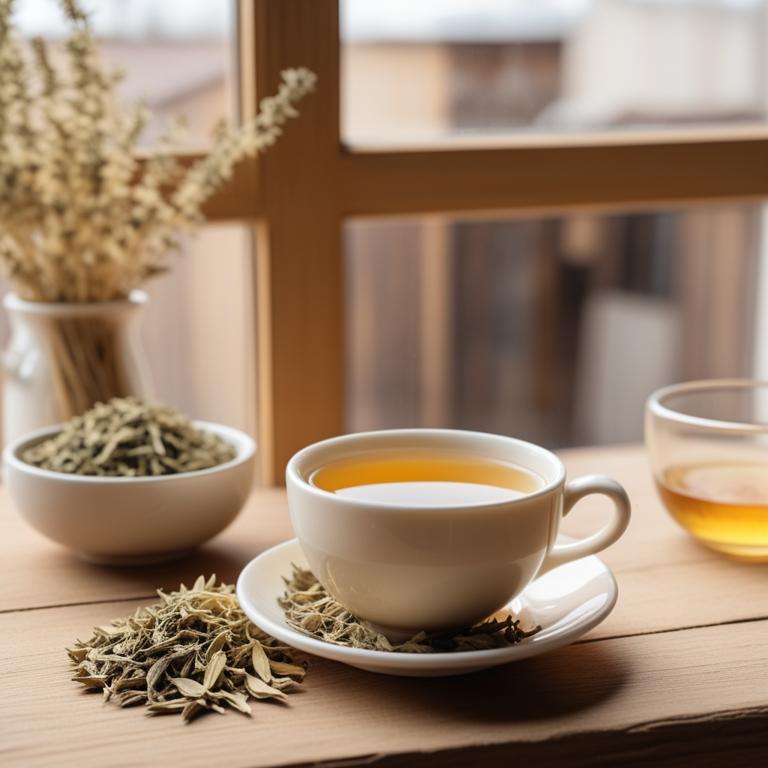9 Herbal Teas For Angina

Herbal teas can be a great way to help manage angina, a condition characterized by chest pain or discomfort due to reduced blood flow to the heart.
Some herbs have been found to help improve blood flow and reduce inflammation, which can help alleviate angina symptoms. One example is Ginkgo biloba, an herb that helps dilate blood vessels, allowing for better blood flow and oxygen delivery to the heart. This can be especially beneficial for people with angina, as it may help reduce the frequency and severity of chest pain episodes. Another herb that may help with angina is Zingiber officinale, commonly known as ginger. Ginger has anti-inflammatory properties, which can help reduce inflammation in the blood vessels and improve circulation. This can also help reduce pain and discomfort associated with angina.
Additionally, ginger has been shown to help lower cholesterol levels and blood pressure, both of which can contribute to angina. Valeriana officinalis, or valerian root, is another herb that may help with angina. Valerian root has a calming effect on the body, which can help reduce stress and anxiety that can trigger angina episodes. It also has anti-inflammatory properties, which can help reduce inflammation in the blood vessels and improve circulation. By reducing stress and inflammation, valerian root may help alleviate angina symptoms and improve overall heart health. Drinking herbal teas can be a simple and effective way to incorporate these herbs into your daily routine. Many people find that drinking herbal teas is a soothing and relaxing way to unwind, and it can be a great alternative to prescription medications.
By incorporating herbal teas into your daily routine, you may find that you are able to manage your angina symptoms more effectively and improve your overall quality of life.
- 1. Ginkgo biloba
- 2. Zingiber officinale
- 3. Valeriana officinalis
- 4. Panax ginseng
- 5. Rosmarinus officinalis
- 6. Centella asiatica
- 7. Crataegus monogyna
- 8. Astragalus membranaceus
- 9. Cinnamomum verum
1. Ginkgo biloba

Ginkgo biloba teas contains flavonoids and terpenoids, which are the bioactive constituents that help with angina.
Flavonoids, such as quercetin and kaempferol, have antioxidant properties that reduce oxidative stress and inflammation in blood vessels, improving blood flow to the heart. Terpenoids, including ginkgolide A and bilobalide, have anti-inflammatory properties that help to relax blood vessels and increase blood flow, reducing chest pain and shortness of breath. Ginkgo biloba teas also help to improve nitric oxide production, a molecule that helps to relax blood vessels and increase blood flow to the heart.
By improving blood flow and reducing inflammation, ginkgo biloba teas can help to alleviate symptoms of angina and improve quality of life.
- Gather 1 teaspoon of dried Ginkgo biloba leaves, 1 cup of boiling water, a tea infuser or a heat-resistant cup, and a spoon.
- Measure 1 teaspoon of dried Ginkgo biloba leaves and put them in the tea infuser or directly into the heat-resistant cup.
- Pour 1 cup of boiling water over the Ginkgo biloba leaves. Let it steep for 5-7 minutes.
- Strain the tea into a separate cup using the tea infuser or a piece of cheesecloth. Discard the solids.
- Drink the Ginkgo biloba tea 2-3 times a day, as needed, to help manage angina symptoms.
2. Zingiber officinale

Zingiber officinale teas contains active compounds like gingerols and shogaols, which have anti-inflammatory properties that help reduce pain and swelling.
These compounds also have vasodilatory effects, which means they can help widen blood vessels and improve blood flow to the heart. This increased blood flow can help reduce the frequency and severity of angina attacks by providing the heart with more oxygen and nutrients. The anti-inflammatory properties of ginger also help reduce inflammation in the blood vessels, which can contribute to angina.
By reducing inflammation and improving blood flow, Zingiber officinale teas may provide relief from angina symptoms.
- Get 1 cup of boiling water and 1 teaspoon of dried or fresh Zingiber officinale root.
- Steep the Zingiber officinale root in the boiling water for 5-7 minutes.
- Strain the tea into a cup using a fine-mesh sieve or cheesecloth.
- Add honey to taste if needed. 1-2 tablespoons of honey is recommended.
- Drink the tea 2-3 times a day, ideally 30 minutes after meals.
Zingiber Officinale Tea on Amazon
FGO Organic Ginger Tea, 100 Count, Eco-Conscious Tea Bags, Caffeine Free, Packaging May Vary (Pack of 1)
Disclaimer: We earn a commission if you click this link and make a purchase at no additional cost to you.
3. Valeriana officinalis

Valeriana officinalis teas contains a mix of active compounds, including valepotriates, valeranone, and isovaleric acid.
These compounds have sedative and anti-inflammatory properties, which may help to relax blood vessels and reduce inflammation in the heart. The relaxation of blood vessels can increase blood flow to the heart, reducing the severity of angina symptoms. Additionally, the anti-inflammatory properties may help to reduce oxidative stress and inflammation in the heart, further alleviating angina symptoms.
By reducing inflammation and promoting blood flow, Valeriana officinalis teas may help to alleviate the symptoms of angina.
- Gather 1 cup of fresh or dried Valeriana officinalis roots.
- Measure 1 tablespoon of Valeriana officinalis roots and place them in a heat-resistant cup.
- Boil 1 cup of water and pour it over the Valeriana officinalis roots in the cup.
- Steep the Valeriana officinalis roots for 5-7 minutes. Strain the liquid using a tea strainer or cheesecloth.
- Drink the tea warm or at room temperature, 2-3 times a day as needed for angina relief.
4. Panax ginseng

Panax ginseng teas contains bioactive constituents like ginsenosides, peptidoglycans, and polysaccharides.
These compounds have anti-inflammatory properties, which can help reduce inflammation in blood vessels and improve blood flow to the heart. Ginsenosides, specifically, can help relax blood vessels and lower blood pressure, both of which are beneficial for people with angina. Additionally, the antioxidant properties of Panax ginseng can help protect the heart from damage caused by free radicals, which can contribute to heart disease.
By improving blood flow and reducing inflammation, Panax ginseng teas may help alleviate the symptoms of angina.
- Gather 2 tablespoons of dried Panax ginseng root.
- Boil 1 cup of water in a pot.
- Add the 2 tablespoons of dried Panax ginseng root to the boiling water.
- Reduce heat and let it simmer for 10-15 minutes.
- Strain the tea and drink it warm, 2-3 times a day.
5. Rosmarinus officinalis

Rosmarinus officinalis teas contains a group of compounds called rosmarinic acid and carnosic acid, which have potent antioxidant and anti-inflammatory properties.
These properties help reduce inflammation in blood vessels, improving blood flow to the heart and reducing the severity of angina symptoms. The antioxidant properties also help protect the heart from oxidative stress, which can contribute to the development of angina. Additionally, rosmarinic acid has been shown to have a vasodilatory effect, which means it helps to widen blood vessels and improve blood circulation.
By improving blood flow and reducing inflammation, Rosmarinus officinalis teas may help alleviate some of the symptoms of angina.
- Get 1 cup of boiling water and a tea infuser.
- Add 1 tablespoon of dried Rosmarinus officinalis leaves to the tea infuser.
- Pour the boiling water over the Rosmarinus officinalis leaves.
- Let the tea steep for 5-7 minutes, then remove the infuser.
- Drink 1 cup of the tea, 2-3 times a day, as needed for angina relief.
6. Centella asiatica

Centella asiatica teas contains triterpenoid saponins, particularly asiatic acid and madecassic acid, which have anti-inflammatory properties that help reduce pain and inflammation in the blood vessels.
These saponins also have antioxidant properties that protect against oxidative stress and free radicals, which can damage blood vessels and worsen angina symptoms. The tea also contains flavonoids, such as quercetin and kaempferol, which have vasodilatory effects, meaning they can help widen blood vessels and improve blood flow to the heart. This increased blood flow can help reduce the frequency and severity of angina attacks.
By reducing inflammation, oxidative stress, and improving blood flow, Centella asiatica teas may help alleviate some of the symptoms associated with angina.
- Gather 1 cup of boiling water and 1 teaspoon of dried Centella asiatica leaves.
- Steep the dried leaves in the boiling water for 5-7 minutes.
- Strain the mixture into a cup and discard the leaves.
- Add 1 tablespoon of honey to the tea, if desired, to sweeten it.
- Drink the tea 2-3 times a day, as needed, to help manage angina symptoms.
7. Crataegus monogyna

Crataegus monogyna teas contains flavonoids, especially oligomeric proanthocyanidins (OPCs), that help with angina.
OPCs have antioxidant properties that protect the heart from damage and improve blood vessel function. The tea also contains triterpenes, such as ursolic acid, which have anti-inflammatory properties that reduce inflammation in the blood vessels. This reduction in inflammation helps to improve blood flow and lower blood pressure, making it easier for the heart to get the oxygen it needs.
The combination of these bioactive constituents in Crataegus monogyna teas may help to alleviate angina symptoms by promoting heart health and improving circulation.
- Gather 1 tablespoon of dried Crataegus monogyna leaves and flowers.
- Use 1 cup of boiling water to make the tea.
- Steep the Crataegus monogyna mixture in the boiling water for 5-7 minutes.
- Strain the tea into a cup and discard the solids.
- Drink 1/2 cup of the tea, 2-3 times a day, for angina relief.
8. Astragalus membranaceus

Astragalus membranaceus teas contains bioactive constituents such as saponins, flavonoids, and polysaccharides that help alleviate symptoms of angina.
Saponins, in particular, have anti-inflammatory properties that reduce inflammation in the blood vessels, improving blood flow to the heart. Flavonoids, such as kaempferol and quercetin, have antioxidant properties that protect the heart from damage caused by free radicals. Polysaccharides, like astragaloside IV, have cardiovascular benefits, including lowering blood pressure and improving heart function.
By reducing inflammation and improving blood flow, Astragalus membranaceus teas helps alleviate angina symptoms and supports heart health.
- Gather 1 cup of water and 1 teaspoon of dried Astragalus membranaceus root.
- Heat the water in a pot until it boils, then reduce the heat.
- Add 1 teaspoon of dried Astragalus membranaceus root to the pot and let it steep for 5-7 minutes.
- Strain the liquid and discard the root. Let the tea cool down.
- Drink 1/2 cup of the tea 2-3 times a day as needed to help manage angina symptoms.
9. Cinnamomum verum

Cinnamomum verum teas contains a compound called cinnamaldehyde, which is responsible for its therapeutic properties.
This compound has anti-inflammatory and antioxidant effects, which can help reduce inflammation and improve blood flow to the heart. Cinnamomum verum teas also contains flavonoids, such as quercetin and kaempferol, which have been shown to have a positive effect on cardiovascular health by reducing oxidative stress and improving blood vessel function. The flavonoids in Cinnamomum verum teas can help relax blood vessels, reducing blood pressure and improving blood flow to the heart, which can help alleviate symptoms of angina.
By improving blood flow and reducing inflammation, Cinnamomum verum teas may help reduce the frequency and severity of angina attacks.
- Gather 1 teaspoon of Cinnamomum verum powder, 1 cup of boiling water, and a cup for the tea.
- Add the Cinnamomum verum powder to the cup.
- Pour the boiling water over the powder in the cup.
- Let the mixture sit for 5-10 minutes to allow the powder to infuse.
- Strain the tea and drink 1/2 cup, 2-3 times a day as needed for angina relief.